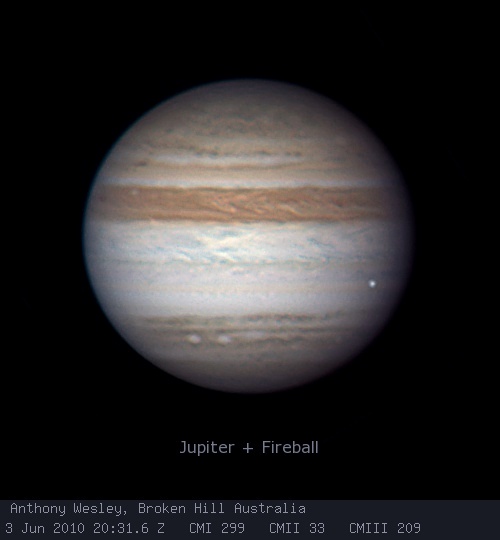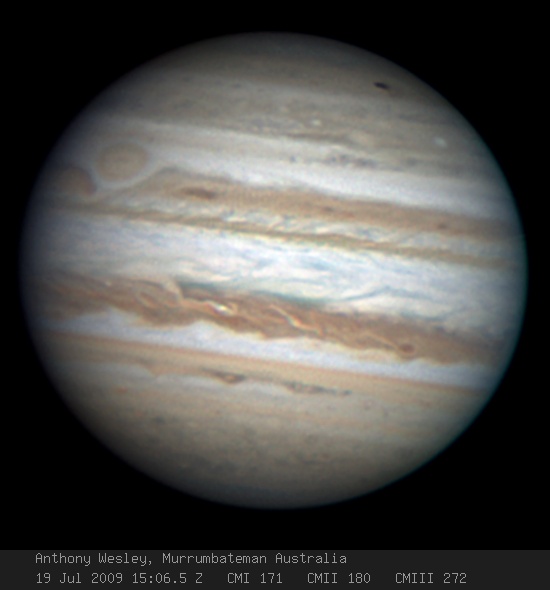Jupiter Impact Captured on Video

Earth is saved! Again… It seems our Grandfather planetThe term "planet" originally comes from the Greek word for "wanderer" since these objects were seen to move in the sky independently from the background of fixed stars that moved together through the seasons. The IAU last defined the term planet in 2006, however the new definition has remained controversial. Click on Term to Read More Jupiter has saved Earth from certain annihilation yet again. An invisible threat made itself visible on June 3rd when a rogue asteroid slammed into Jupiter and created a brilliant explosion visible from the relative safety of our own home planet.
At 20:31:29 on June 3rd, 2010 Anthony Wesley, an amateur astronomer and astrophotographer in Australia captured on video, an actual asteroid impacting the gas giant Jupiter. The brilliant flash and fireballA fireball is another term for a very bright meteor, generally brighter than magnitude -4, which is about the same magnitude of the planet Venus as seen in the morning or evening sky. A bolide is a special type of fireball which explodes in a bright terminal flash at its end, often with visible fragmentation. Click on Term to Read More created by this impact is said to be the equivalent of thousands of nuclear explosions detonating at once.

This isn’t the first time Anthony found evidence of an asteroid impact on Jupiter. Last year on July 19, 2009 Anthony took this now world famous photo.
The coolest part about this most recent event is that Anthony captured the actual impact on video!
Jupiter acts as our bodyguard. The massive forces of gravityAttractive force between all matter - one of the four fundamental forces. Click on Term to Read More that Jupiter exert on celestial bodies which come close enough are enough to rip apart huge comets and asteroids and suck them into the depths of it’s gaseous atmosphere thereby removing the threat of that body impacting with the Earth.
There is so much unseen debris floating around out there in space. We’re finding more new NEO (Near Earth Objects) every day. Literally. It’s only a matter of time until we findMeteorite not seen to fall, but recovered at some later date. For example, many finds from Antarctica fell 10,000 to 700,000 years ago. Click on Term to Read More another object that might just impact Earth like we did with Asteroid 2008 TC3. This particular asteroid was found by Richard Kowalski with the Catalina Sky Survey. Richard is an asteroid hunter, and discovered the first asteroid ever in the history of mankind to have been predicted to impact Earth. Not only was the time of asteroid impact predicted, but the place of impact and subsequently meteorites were found by scientists thanks to this data.
Jupiter has saved our planet from asteroid and cometConglomeration of frozen water and gases (methane, ammonia, CO2) and silicates that that formed in the outer solar system and orbits the Sun. In recent years, the description of comets has shifted from dirty snowballs to snowy dirtballs with more dust than ice. However, the ratio is less than 10-to-1. Click on Term to Read More impacts more times than we can ever fathom. However, that doesn’t mean there’s not another asteroid out there with our name on it. Let just hope that Jupiter keeps on doing what it’s been doing for billions of years.
Protecting Earth…
————————————————————————————
From Spaceweather.com – “...I still can’t believe that I caught a live impact on Jupiter,” says Go, who has made a must-see video of the event.
“There were no visible remains at the impact point for the next half hour or so, until sunrise put an end to the imaging,” says Wesley…”
Jupiter Asteroid Collision Resource Links:
- Fazekas, Andrew “Bright Fireball Slams Into Jupiter” – National Geographic, June 4, 2010
- Moskvitch, Katia “Jupiter collision ‘was asteroid’” – BBC News, June 4, 2010
- Collins, Hugh “Amateur Astronomers Spot Massive Fireball on Jupiter” – AOL News, June 4, 2010






